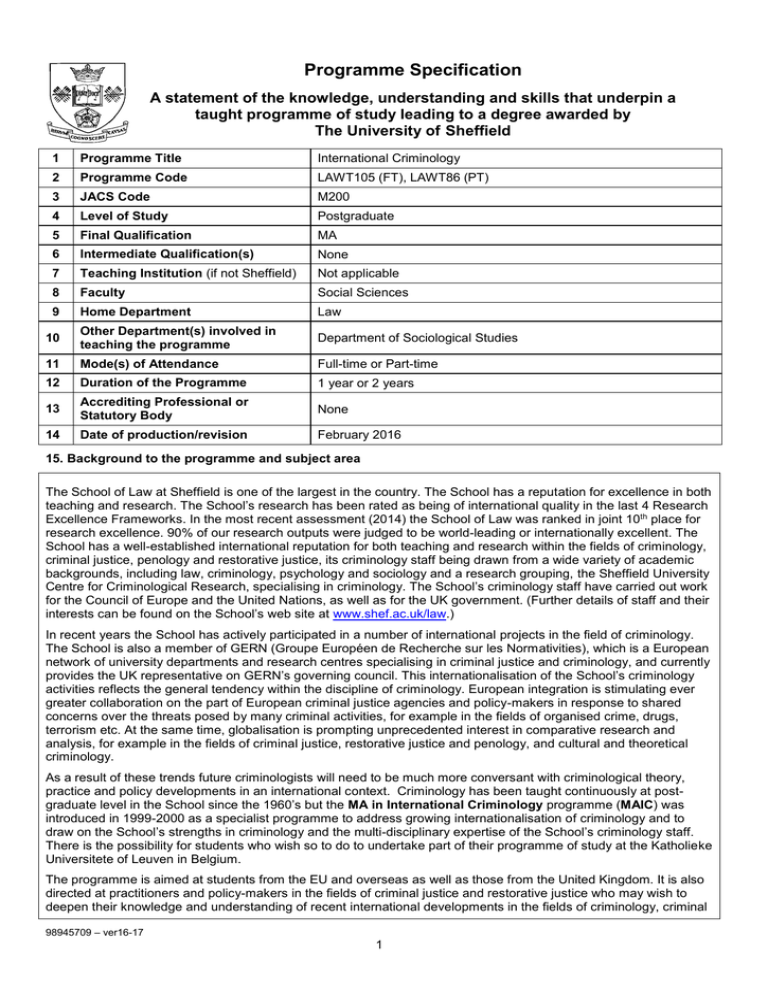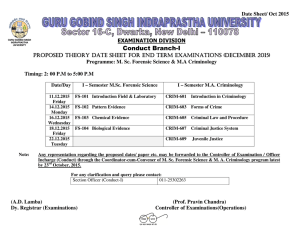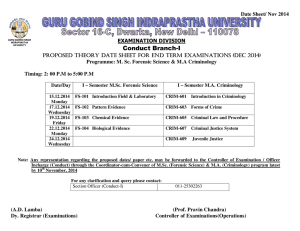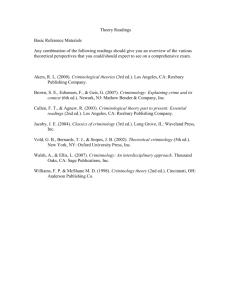Document 16109871
advertisement

Programme Specification A statement of the knowledge, understanding and skills that underpin a taught programme of study leading to a degree awarded by The University of Sheffield 1 Programme Title International Criminology 2 Programme Code LAWT105 (FT), LAWT86 (PT) 3 JACS Code M200 4 Level of Study Postgraduate 5 Final Qualification MA 6 Intermediate Qualification(s) None 7 Teaching Institution (if not Sheffield) Not applicable 8 Faculty Social Sciences 9 Home Department Law 10 Other Department(s) involved in teaching the programme Department of Sociological Studies 11 Mode(s) of Attendance Full-time or Part-time 12 Duration of the Programme 1 year or 2 years 13 Accrediting Professional or Statutory Body None 14 Date of production/revision February 2016 15. Background to the programme and subject area The School of Law at Sheffield is one of the largest in the country. The School has a reputation for excellence in both teaching and research. The School’s research has been rated as being of international quality in the last 4 Research Excellence Frameworks. In the most recent assessment (2014) the School of Law was ranked in joint 10th place for research excellence. 90% of our research outputs were judged to be world-leading or internationally excellent. The School has a well-established international reputation for both teaching and research within the fields of criminology, criminal justice, penology and restorative justice, its criminology staff being drawn from a wide variety of academic backgrounds, including law, criminology, psychology and sociology and a research grouping, the Sheffield University Centre for Criminological Research, specialising in criminology. The School’s criminology staff have carried out work for the Council of Europe and the United Nations, as well as for the UK government. (Further details of staff and their interests can be found on the School’s web site at www.shef.ac.uk/law.) In recent years the School has actively participated in a number of international projects in the field of criminology. The School is also a member of GERN (Groupe Européen de Recherche sur les Normativities), which is a European network of university departments and research centres specialising in criminal justice and criminology, and currently provides the UK representative on GERN’s governing council. This internationalisation of the School’s criminology activities reflects the general tendency within the discipline of criminology. European integration is stimulating ever greater collaboration on the part of European criminal justice agencies and policy-makers in response to shared concerns over the threats posed by many criminal activities, for example in the fields of organised crime, drugs, terrorism etc. At the same time, globalisation is prompting unprecedented interest in comparative research and analysis, for example in the fields of criminal justice, restorative justice and penology, and cultural and theoretical criminology. As a result of these trends future criminologists will need to be much more conversant with criminological theory, practice and policy developments in an international context. Criminology has been taught continuously at postgraduate level in the School since the 1960’s but the MA in International Criminology programme (MAIC) was introduced in 1999-2000 as a specialist programme to address growing internationalisation of criminology and to draw on the School’s strengths in criminology and the multi-disciplinary expertise of the School’s criminology staff. There is the possibility for students who wish so to do to undertake part of their programme of study at the Katholieke Universitete of Leuven in Belgium. The programme is aimed at students from the EU and overseas as well as those from the United Kingdom. It is also directed at practitioners and policy-makers in the fields of criminal justice and restorative justice who may wish to deepen their knowledge and understanding of recent international developments in the fields of criminology, criminal 98945709 – ver16-17 1 justice and restorative justice. MAIC is normally a full-time, one-year programme. which offers students a choice of three pathways: a Taught path, a Restorative Justice path, or a Research path. Students may enrol on a part-time basis, thereby undertaking this programme of study over the course of two years. Under the part-time option, however, only the Taught pathway and Restorative Justice pathway options are available. The Taught Course pathway is a taught Master’s programme for students with university degrees in law, the social sciences or humanities who are interested in criminology, criminal justice and crime prevention, with a particular emphasis on developments at a European and International level. Professionals wishing to develop their understanding of trans-national developments in criminology and criminal justice may also choose to follow this path. It combines a number of 'foundational' social science skills and methods courses with a selected range of subjects focusing on different aspects of contemporary comparative criminology. The Restorative Justice pathway aims to place recent developments in the fields of restorative justice, mediation and victimology in their contemporary criminological context while enabling students who are suitably qualified or experienced to work in a relevant placement as a prelude to the final dissertation. It therefore combines some taught courses with practical placement experience in a relevant agency. This path is aimed primarily at practitioners, researchers and students wanting to extend their knowledge and experience of this developing field. The Research Training pathway places greater emphasis on the acquisition and application of those social science skills and methods that are likely to be required for a more extended period of post-graduate study and is best suited to those suitably qualified and experienced students who already hold an undergraduate degree and are contemplating a doctorate and/or a career in research. There will be a substantial element of Research Training in the social sciences, but it will be possible to combine this with additional options selected from those offered on our Taught Course pathway. Further information is available at www.shef.ac.uk/law. 16. Programme aims 1. to provide all students with an adequate grounding in the relevant social science-based research skills and training which they will need in order to complete the programme; 2. to provide all students with expert, relevant and up-to-date information about contemporary and emergent theoretical, empirical and policy-related developments in the fields of criminology and criminal justice with a particular emphasis on the comparative aspects of these developments; 3. to acquaint all students with the problems inherent in undertaking comparative research in the fields of criminology and criminal justice; 4. to equip all students with the knowledge and skills which will enable them to critically evaluate ‘leading edge’ findings drawn from the fields of comparative criminology and related disciplines; 5. to offer appropriately qualified students an opportunity to combine appropriate theoretical study, skills-based training and practical experience in the developing field of restorative justice which will also enhance any existing skills and qualifications; 6. to offer professionals and practitioners who may already have appropriate qualifications and experience in the field of criminal justice the opportunity to enhance or update their existing professional or vocational qualifications; 7. to provide students who wish to undertake research degrees in the field of comparative criminology or criminal justice the relevant research training and assistance they will require before embarking on their own research programmes. 98945709 – ver16-17 2 17. Programme learning outcomes Knowledge and understanding: K1 of the problems of international crime and responses thereto in Europe and the wider international community. K2 of expert, up-to-date information about contemporary and emergent theoretical, empirical and policy-related developments in the fields of criminology and criminal justice, with a particular emphasis on international and comparative developments. K3 of a range or criminological research methods and techniques, and especially of comparative research methods and techniques. K4 of the particular problems inherent in undertaking comparative criminological research. Skills and other attributes: S1 Undertake criminological research using relevant primary and secondary sources and using paper and electronic materials. S2 Evaluate and critically analyse current, “leading edge” research and scholarship in the areas of international and/or comparative criminology and related disciplines. S3 Communicate effectively orally and in writing, using language accurately and effectively. S4 Make appropriate use of information technology including for communication and research. S5 Work effectively without direction; organise work and manage time effectively. 18. Teaching, learning and assessment Development of the learning outcomes is promoted through the following teaching and learning methods: All modules are taught by means of seminars, which may be staff or student-led, with the exception of Issues in Restorative Justice which is taught by means of appropriate agency placement. The knowledge base (K1 – 4) is developed through preparation for and participation in seminars. Skills of critical analysis and evaluation (S2) and oral communication (S3) are developed through participation in seminars. Research and written communication skills (S1, S3 and S4) are developed though preparation of written coursework and the course dissertation. Skills of personal organisation and time management are not formally taught but are developed through preparation of written coursework and the course dissertation. Opportunities to demonstrate achievement of the programme learning outcomes are provided through the following assessment methods: Taught modules are assessed by coursework essay, comprising one piece of work of not more than 3,000 words in length for a 15 credit module and two such essays for a 30 credit module. Such coursework assesses knowledge and understanding, skills of critical analysis, research skills and written communication skills. Research skills, written communication skills and skills of legal analysis are further assessed by the programme dissertation. Oral communication and skills of personal organisation and time management are not formally assessed, but the latter are indirectly assessed in the preparation especially of assessed coursework and the course dissertation. 98945709 – ver16-17 3 19. Reference points The learning outcomes have been developed to reflect the following points of reference: Subject Benchmark Statements http://www.qaa.ac.uk/AssuringStandardsAndQuality/subject-guidance/Pages/Subject-benchmarkstatements.aspx Framework for Higher Education Qualifications (2008) http://www.qaa.ac.uk/Publications/InformationAndGuidance/Pages/The-framework-for-higher-educationqualifications-in-England-Wales-and-Northern-Ireland.aspx University Strategic Plan http://www.sheffield.ac.uk/strategicplan Learning and Teaching Strategy (2011-16) http://www.shef.ac.uk/lets/staff/lts The research interests of members of the Centre for Criminological and Legal Research. 20. Programme structure and regulations The programme is offered with three “pathways” - the “Taught” pathway, the “Restorative Justice” pathway and the “Research” pathway - enabling each student to choose the pathway and programme of study which best suits their needs and interests. Students register for the programme as a whole and then choose which pathway to pursue in consultation with staff after arriving in Sheffield. In order to obtain the degree students must obtain 180 credits. All students must study taught modules worth, in total, 120 credits, and complete and submit a dissertation of 10,000-12,000 words in length, worth 60 credits. All students must study certain foundational modules in criminology and social sciences – Responding to Crime in Europe, Issues in Comparative Penology, The Cultures of Criminology and The Research Process, worth, together, 60 credits, which provide an introduction to the trans-national problems facing criminology today and to criminological research. Students following the Taught Pathway may then choose modules worth a further 60 credits from a range of optional modules. Students following the Restorative Justice Pathway must study Restorative Justice, Mediation and Victimology and Issues in Restorative Justice, worth in total 45 credits, and may then choose one module worth 15 credits from a range of optional modules. Students pursuing the Research Pathway must study Qualitative Research Methods, Quantitative Research Methods and Methods of Criminological Research, providing an introduction to appropriate research methods, and then complete their programme of study by studying one module worth 15 credits from a range of optional modules. This pathway is only available to full time students. Detailed information about the structure of programmes, regulations concerning assessment and progression and descriptions of individual modules are published in the University Calendar available on-line at www.shef.ac.uk/calendar. 21. Progression through the programme structure The full-time programme is designed to be taken over one year of study. Students on all three pathways within the full-time programme progress from a compulsory programme of study in semester 1 – comprising Responding to Crime in Europe, Issues in Comparative Penology, The Cultures of Criminology and The Research Process, which together introduce the themes of the programme – to a second semester which, for those on the Taught pathway, contains a large degree of optionality. Students on the Research and Restorative Justice pathways enjoy a more limited degree of optionality during semester 2, when the programme of study focuses on research methods or restorative justice, as the case may be. Substantive criminological knowledge is developed over the duration of the course, many of the modules offered in semester 2 building on knowledge acquired as a result of study in semester 1. 98945709 – ver16-17 4 Research skills are developed throughout the programme. For students on all three pathways research is introduced in semester 1 with The Research Process. All students have the chance to develop their study of research methods by studying Quantitative Methods or Qualitative Methods. These modules are taught over semesters 1 and 2 but are assessed during semester 2. (Students on the Research Pathway must study both of these modules and Methods of Criminological Research). The skills developed through these modules and practised in preparation of assessed coursework for taught modules are utilised in preparation of the programme dissertation, which allows students to demonstrate their enhanced ability to work at postgraduate level utilising the skills and knowledge acquired during the preceding two teaching semesters. Students are enrolled in the graduate semester module Dissertation beginning in semester 1, work more intensively on their research project in semester 2 and have the summer available to write up their project. Dissertations are due for submission in late August. The part-time programme is designed to be taken over two years of study. However, in order for the 60 credit dissertation to be completed in year 2 the balance of course work modules must be shifted so that the degree’s 180 credits are evenly split across years 1 and 2. Students in the Taught pathway would take three compulsory modules in semester 1 - Responding to Crime in Europe, Issues in Comparative Penology and The Cultures of Criminology. They would then select three optional modules in semester 2; they would take the compulsory module The Research Process and begin the graduate year module Dissertation in semester 3; and finally they would take one optional module in semester 4. Students in the Restorative Justice pathway would follow the same program of three compulsory modules in semester 1. In semester 2 they would take the module Restorative Justice plus two optional modules. In semesters 3 and 4 they would take the graduate year modules Issues in Restorative Justice and Dissertation. 22. Criteria for admission to the programme Detailed information regarding admission to the programme is available in the University’s On-Line Prospectus at www.shef.ac.uk/prospective. 23. Additional information This specification represents a concise statement about the main features of the programme and should be considered alongside other sources of information provided by the teaching department(s) and the University. In addition to programme specific information, further information about studying at The University of Sheffield can be accessed via our Student Services web site at www.shef.ac.uk/ssid. 98945709 – ver16-17 5




